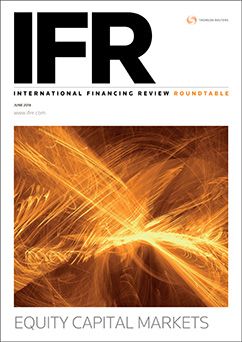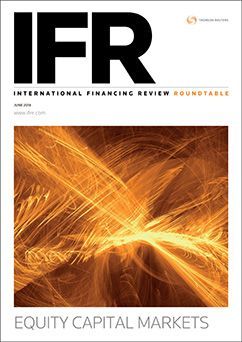Thomson Reuters IFR’s 2018 ECM Roundtable took place in London on April 11. It was a fascinating moment-in-time discussion that covered general market matters but more specifically looked under the bonnet of deal management and tactics, and how to get transactions over the line in the challenging environment the year had become.
On a top-level macro view, economic growth and corporate earnings are both relatively solid. But in a rising interest rate scenario, queasy conditions in global credit markets, uncertainties around the inflation picture and unsettling political and geopolitical issues, equity markets had been volatile in the run-up to IFR’s roundtable, as market participants found it tough to figure out degrees of risk and align them with pricing and valuation.
While fund flows had continued to be equities-positive, the flow into passive strategies was continuing to impact how deals get done in the primary market. The mood of IFR’s panel was a little downbeat vis-à-vis the overall dealmaking environment though panellists were all agreed that the market is open for the right deal for the right company at the right price.
The IPO pipeline in the immediate run-up to the roundtable had been extremely active – 14 companies had issued intention-to-float announcements – but a combination of tricky valuation calls, a cluster of candidates deemed in some cases to be less than ‘must-have’ names in a buyer’s market, greater buyside selectivity, some poor trading performances, and the availability of private capital all played into the psyche of our dealmaking panel.
Beyond the tactical matters of getting pricing ranges at the right level, there was a unanimous sense that not all of the deals in the pipeline would actually get that far. But there was a feeling that it is better to have a deal pulled before it hits bookbuilding than have it fail by performing poorly for investors.
There was lively discussion around the process, which in Europe is still too elongated but early-look investor engagement had become a little convoluted. Contact needs to be rowed back to where it can more constructively provide valuation guidance and price elasticity to enable underwriters to get a better sense of what the feedback is telling them so they can gauge how to create momentum when they get to bookbuilding.
It is also important for underwriters to have tough conversations early with companies or vendors, particularly if they have unrealistic expectations around pricing. The name of the game is de-risking the process and creating end-to-end visibility for all. Using market conditions as an excuse for deals that don’t work is not an answer.
On the subject of syndicate size, there were mixed views. Some panellists believe that large syndicates are good if they’re complementary and the capabilities of every syndicate member are leveraged. In the wake of MiFID II and the poor economics of the cash equity business, some banks have been lightening their distribution hence the need for multiple hands. Incentive fees may be a positive to get all of the syndicate putting in the required level of effort. On the other hand, large syndicates can create risks in terms of true deal leadership and proper accountability.
To see the digital version of this roundtable, please click here
To purchase printed copies or a PDF of this report, please email gloria.balbastro@tr.com


